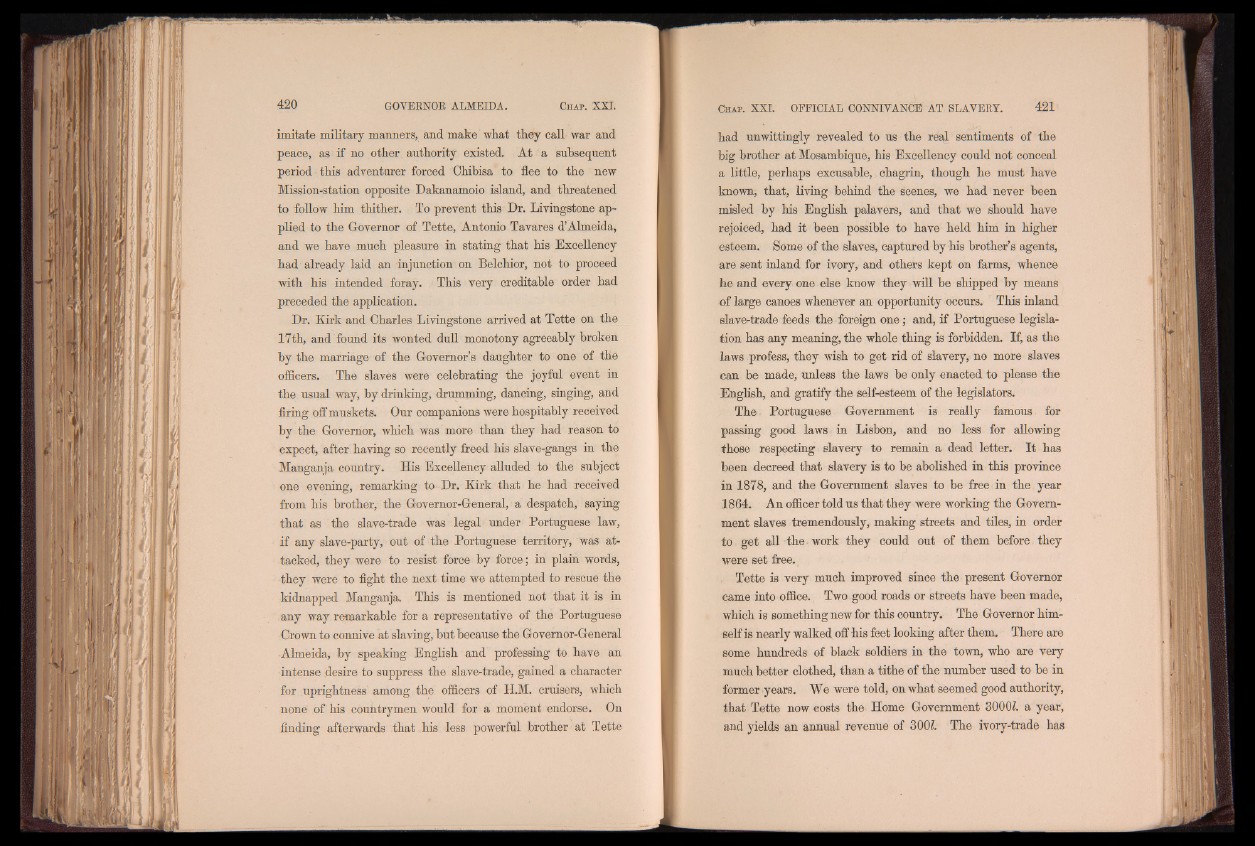
imitate military manners, and make what they call war and
peace, as if no other authority existed. At a subsequent
period this adventurer forced Chibisa to flee to the new
Mission-station opposite Dakanamoio island, and threatened
to follow him thither. To prevent this Dr. Livingstone applied
to the Governor of Tette, Antonio Tavares d’Almeida,
and we have much pleasure in stating that his Excellency
had already laid an injunction on Belchior, not to proceed
with his intended foray. This very creditable order had
preceded the application.
Dr. Kirk and Charles Livingstone arrived at Tette on the
17th, and found its wonted dull monotony agreeably broken
by the marriage of the Governor’s daughter to one of the
officers. The slaves were celebrating the joyful event in
the usual way, by drinking, drumming, dancing, singing, and
firing off muskets. Our companions were hospitably received
by the Governor, which was more than they had reason to
expect, after having so recently freed his slave-gangs in the
Manganja country. His Excellency alluded to the subject
one evening, remarking to Dr. Kirk that he had received
from his brother, the Governor-General, a despatch, saying
that as the slave-trade was legal under Portuguese law,
if any slave-party, out of the Portuguese territory, was attacked,
they were to resist force by force; in plain words,
they were to fight the next time we attempted to rescue the
kidnapped Manganja. This is mentioned not that it is in
any way remarkable for a representative of the Portuguese
Crown to connive at slaving, hut because the Governor-General
Almeida, by speaking English and professing to have an
intense desire to suppress the slave-trade, gained a character
for uprightness among the officers of H.M. cruisers, which
none of his countrymen would for a moment endorse. On
finding afterwards that his less powerful brother at Tette
had unwittingly revealed to us the real sentiments of the
big brother at Mosambique, his Excellency could not conceal
a little, perhaps excusable, chagrin, though he must have
known, that, living behind the scenes, we had never been
misled by his English palavers, and that we should have
rejoiced, had it been possible to have held him in higher
esteem. Some of the slaves, captured by his brother’s agents,
are sent inland for ivory, and others kept on farms, whence
he and every one else know they will be shipped by means
of large canoes whenever an opportunity occurs. This inland
slave-trade feeds the foreign one; and, if Portuguese legislation
has any meaning, the whole thing is forbidden. If, as the
laws profess, they wish to get rid of slavery, no more slaves
can be made, unless the laws be only enacted to please the
English, and gratify the self-esteem of the legislators.
The Portuguese Government is really famous for
passing good laws in Lisbon, and no less for allowing
those respecting slavery to remain a dead letter. I t has
been deereed that slavery is to be abolished in this province
in 1878, and the Government slaves to be free in the year
1864. An officer told us that they were working the Government
slaves tremendously, making streets and tiles, in order
to get all the work they could out of them before they
were set free.
Tette is very much improved since the present Governor
came into office. Two good roads or streets have been made,
which is something new for this country. The Governor himself
is nearly walked off his feet looking after them. There are
some hundreds of black soldiers in the town, who are very
much better clothed, than a tithe of the number used to be in
former years. We were told, on what seemed good authority,
that Tette now costs the Home Government 30001. a year,
and yields an annual revenue of 3001. The ivory-trade has